Studying for Honours in ecology/evolutionary biology, with a focus on bats. Studying with ✨ADHD✨ Aussie. This is my studyblr side-blog, my main is @somethingelsefine My Instagram is @zoologywyfe
Don't wanna be here? Send us removal request.
Text
Finishing off my poster, ready for the International Bat Research Conference next week! Absolutely stoked to be attending it 😄
1 note
·
View note
Text
don't listen to them babe just keep opening more tabs in your browser
90K notes
·
View notes
Text
How I Study Anatomy
Everyone says NEVER TRACE!! THAT'S ART THEFT! Ok but we can do a little crime in the name of Learning.
Trace to learn, not to earn.
I like to take my own photos, but you can study whatever you want. Link back to original photos, and don't post copied artwork unless the artist is dead, cool with it, or both.
As always with learning, start every sketch with the intent to throw it away (trash for paper, quitting without saving for digital) This takes the pressure off and lets you make Bad Art, which is very important.
So let's make Bad Art of a Deer because I happen to have one handy
Start with a photo of your subject in a nice/neutral pose with all four feet visible. (so not like me)
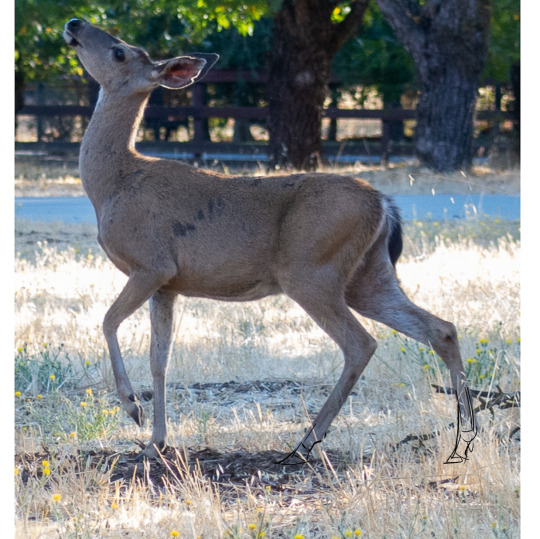
Freehand copy it. Try not to stylize, focusing instead of matching proportions and pose. Don't get too detailed!
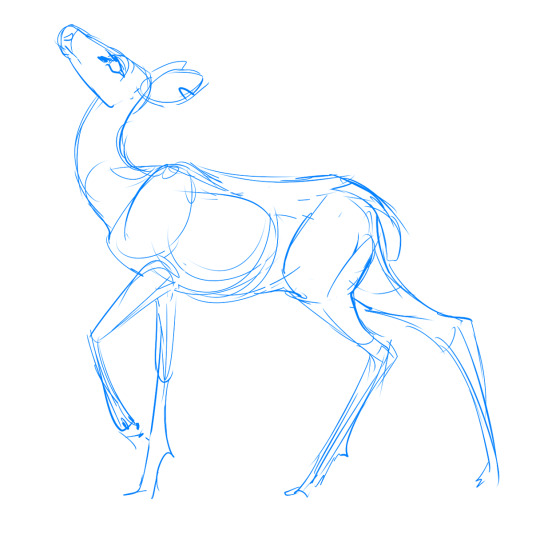
It's ok if your art looks terrible and has broken legs. I've drawn LOTS of deer so I have a leg up. Everyone's art sucks in their own eyes and here's where mine went wrong:
Either lasso-distort (recommended for beginners) or redraw a copy of your first sketch with your reference behind it (scaled to match the main body of your sketch)
Put the original and modified sketches together and compare the differences. Write it down if you want. This shows you where your eyes saw things the wrong size, so you can correct for that next time.
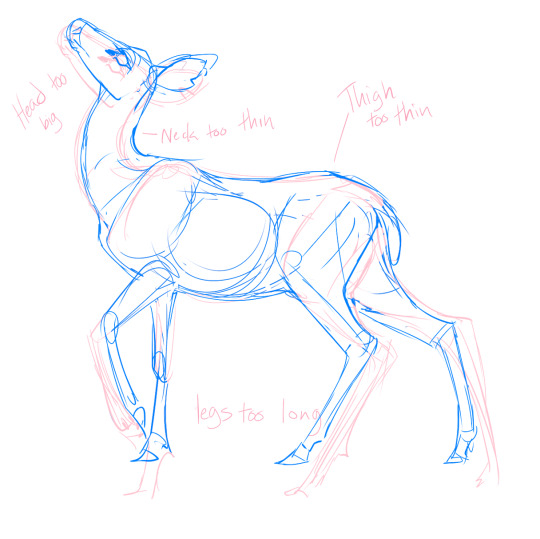
After learning about both deer and yourself, try freehand copying again.
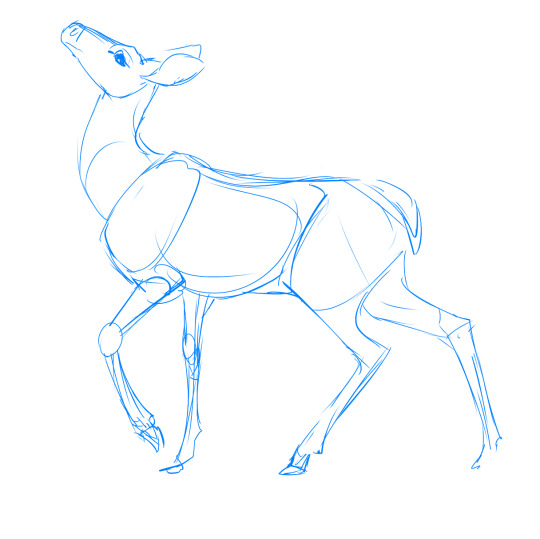
Marvel at your newfound knowledge and skill!
but there's always room for improvement
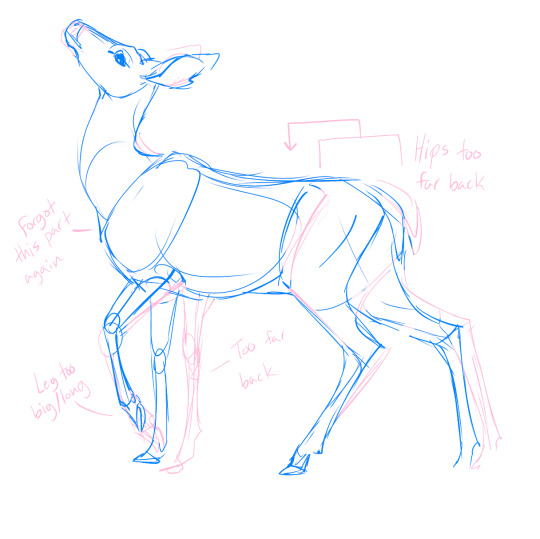
You can stop here and move on to your real drawing, Or do another freehand-fix-compare cycle. I actually overcorrected my "draws heads too big" and veered into "heads too small."

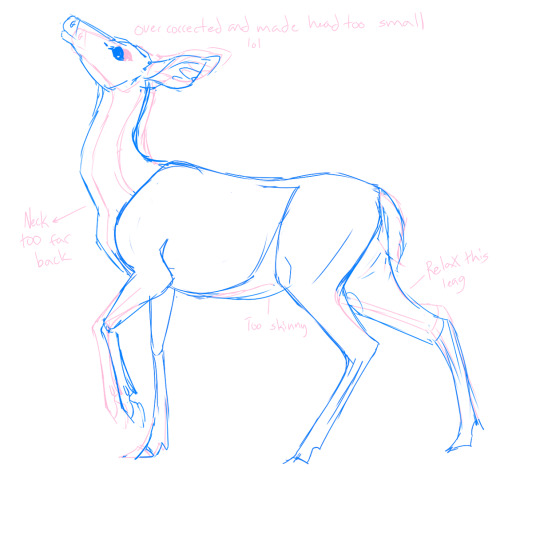
Another note on tracing: Learning HOW to trace is more important than anything you could learn By tracing. Draw the Anatomy, not the outline. In real life, things don't have outlines, they have bones.
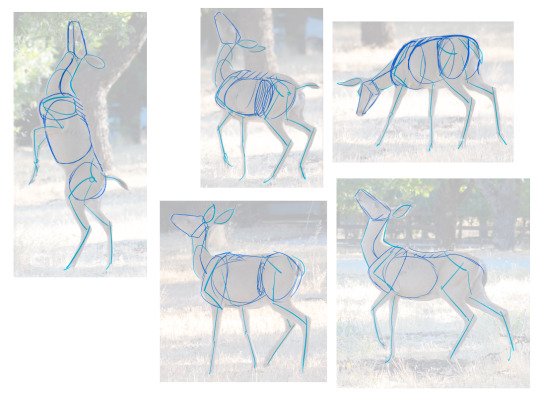
These are from the same shoot which is extra useful for consistency. The lines are minimal and follow where the animals joints are, and only important parts are drawn.
You won't know what Important Parts means right off the bat, which is where in-depth study comes in. You need to do learn the hard parts to do the easy parts right.
Next up: how to study bones and muscles.
36K notes
·
View notes
Text


Desk pic, and a close up of my new mouse pad ! It's got a rhinolophus robertsi on it! ( One of the species I'm studying).
From this amazing artist 😁
1 note
·
View note
Text
Writing Notes: Good Science & Pseudoscience

The process of science always features certain core characteristics.
These central tenets mark the difference between real, reliable science and pseudoscience.
It can sometimes be difficult to tell the difference between good science and pseudoscience, the latter being a study or process that seems scientific but actually cuts corners and therefore delivers unreliable results.
Key Characteristics of Science
Good science always possesses certain core traits. These 7 characteristics of scientific knowledge provide a foundation for all our understanding of the world around us:
Empirical verifiability: Scientific explanations rest on the ability to display your findings with empirical evidence. If you make any assertion in a scientific discipline, you must be able to show the exact reasons for the claim as well as a testable way to prove your assertion is consistent with reality itself. Some fields of science are primarily theoretical, but even they rely on ironclad mathematical theorems that stand up to the strictest forms of testability.
Ethical neutrality: Scientific investigations generally leave considerations of morality outside of their equations. Consider something like the development of nuclear technology. While this technology has helped human beings cause great harm to each other, it has also brought significant gains to well-being. Scientists care about data and the pursuit of truth, and they leave ethical considerations up to those who make use of what they discover.
Malleability: Modern science certainly looks different than science from the times of astronomer Galileo Galilei or physicists Isaac Newton and Albert Einstein. That’s because scientists know even the most widely creditable theorems can turn out to be falsifiable. New data changes assumptions all the time. This is one of the main reasons why peer review is such an important factor in scientific study.
Objectivity: Good science relies on people’s ability to be as objective as possible. If you approach a science experiment with a preconceived notion in mind, you should reevaluate your basic approach. All scientists must go where the data leads them and not force their desires or conclusions on their experiments too early, no matter whether they specialize in the physical sciences or more recent technologies, such as AI.
Observability: When you set out to test a scientific hypothesis, you do so in an attempt to observe new evidence in real time. Consider a life science experiment many people do themselves without even knowing it: gardening. When you make adjustments to their light or water to assist their growth, you’re embarking on a rudimentary form of the same process of systematic observation and experimentation that undergirds the most complex scientific research methods.
Replicability: It’s the nature of science to be repeatable. Every experiment you do should be capable of replication, from truly basic research to more complex forms of experimentation. From computer science to biology and beyond, the scientific community must present data that is consistent from test to test. This replicability is what makes science such a reliable discipline overall.
Systematic reliability: Science is innately replicable and, as a result, systematically reliable as well. If you follow a scientific methodology, you can rely on the system itself to present you with the same results each time. For instance, if you run an experiment with the exact same independent and dependent variables and chart your results on a graph, you should expect them to be the same—or at least remarkably similar—every time you do.
Natural Sciences vs. Social Sciences
Natural sciences differ from the social sciences in terms of their emphasis on extreme precision.
Part of this is due to how phenomena in the natural world are more easily quantifiable.
This is in contrast to social sciences—for example, the study of why a certain human being or an entire group of people behaves a certain way (as is the case with psychology and sociology, respectively).
Science is a field of human endeavor that aims to better understand how the real world works through empirical questioning and repeated testing.
The field of science features numerous different specific disciplines.
All of these work in concert to provide the human race a means by which to accomplish a systematic exploration of the universe around them.
By way of analogy, science as a whole is like a symphony orchestra whereas each specific discipline (like physics, biology, and so on) are instruments within the ensemble.
Source ⚜ More: Notes & References ⚜ Writing Resources PDFs
93 notes
·
View notes
Text
Y’ever read something and have understanding that has eluded you interminably suddenly stop, curl up, and snuggle neatly into a fold in your brain because a new way way opened to it?
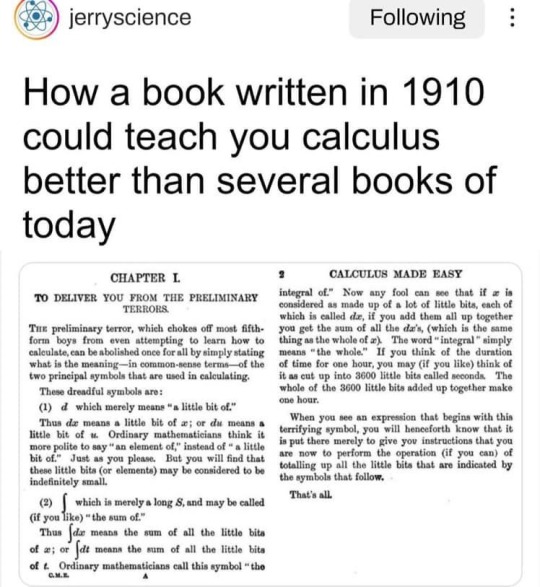
218K notes
·
View notes
Text
* blows a kiss to my computer * for JSTOR
5K notes
·
View notes
Text
You should never have shame about your academic journey. It's a journey. You're growing and learning. You're going to face challenges alone for one of the first times in your life. Shit's hard. It's ok to struggle.
I haven't had a pretty journey at all. I'm graduating with a bachelor's degree at 25. I've been in college nonstop since I was 18. I've failed a lot of classes and had to go part time. So many things have happened. But I will have the degree. And that degree is worth the exact same as someone who got it in 3 years. The knowledge I have is mine to keep.
How I got here doesn't matter. I'm here. I am going to graduate in a few months. I have won this chapter of my life. And to those who try to shame me for how I got here and how long it took, I pray that you never experience the things I have that have made it take long. May you live a life of comfort and luxury and have hands soft as silk until you die. And hopefully I will get the same grace from the universe eventually.
#everyone's academic journey is different#it took me 5 years before I could go back to uni to start my honours research#I know people who I graduated my bachelor's with who are now defending their PhD thesis#it's good to remember there's no secret deadline#student#studyblr#life lessons
1K notes
·
View notes
Text
Another late night at uni, finally finished and submitted my tech report, only about 5 hours late but hey it's done and that's the main thing
#studyblr#uni#assignments#report writing#finished after the deadline in classic ADHD fashion#better late than never#realistic studyblr#zoology studyblr#honours
1 note
·
View note
Text
At this point, my dreams look like the matrix
If R was a person, I would be in jail for murder by now
4 notes
·
View notes
Text
If R was a person, I would be in jail for murder by now
#statistics#R#Studio#geometric morphometrics#gonna have a menty b#zoology studyblr#uni#studyblr#academic#science is hard
4 notes
·
View notes
Text

Slowly getting there, couple of days until this report is due. What would y'all prescribe for R -induced headaches ?
#R will be the death of me#statistics#Studio#studyblr#uni#studying#laptop#3d morphometrics#honours#research#zoology
0 notes
Note

Hmmm, sad to see her hanging with the wrong crowd
That looks like THE BEST PARTY EVER.

492 notes
·
View notes
Text
Getting somewhere, look I made a plot, do I understand how I did it? That's a problem for tomorrow.

7 notes
·
View notes


